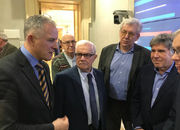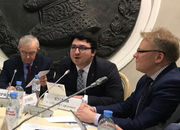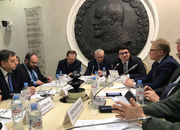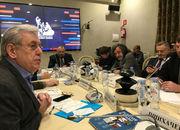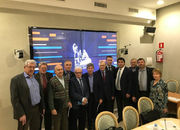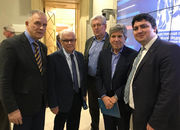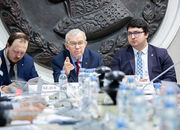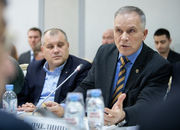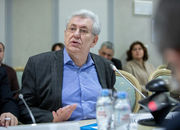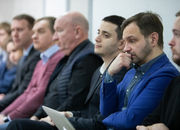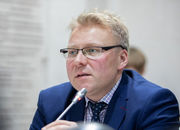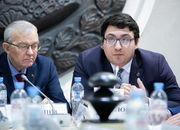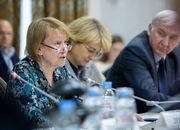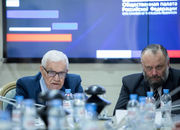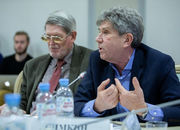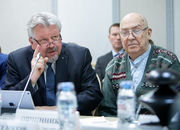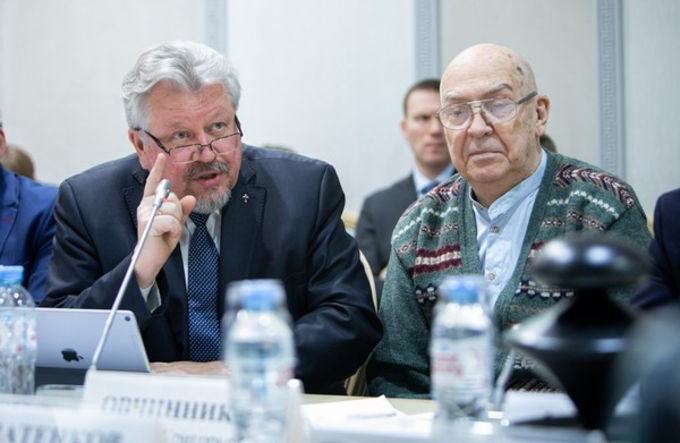
Religious Freedom: The Commission for the Protection of Religious Rights
The event was organized by the Russian Federation Public Chamber Commission in conjunction with inter-ethnic and inter-religious relations. The meeting was co-organized by the organization “Russian Association for the Protection of Religious Freedom”, and the Slavic Legal Center.
In attendance were representatives of leading research centers, lawyers, human rights activists, religious scholars and representatives of religious organizations. The Russian UECB Denomination was represented by President Peter Mitzkevich and V.P. Victor Ignatenkov.
Background:
October 16, 2019 The commissions of the Presidential Human Rights Council (HRC) and the Council for Cooperation with Religious Associations, under the President of the Russian Federation, lawyer Vladimir Ryakhovsky proposed the creation of the institution to the Commissioner for the Protection of the Right to Religious Freedom.
Events held in 2019 in the Public Chamber of the Russian Federation on the topic of harmonizing interreligious relations of the government-confessional dialogue, such as the 2nd All-Russian Forum, entitled “Law, Religion and State.”
November 21-22, 2019 Round Table: Actual problems of religious organizations related to the establishment and functioning of religious buildings and worship, ceremonies and ceremonies in other places were also discussed by lawyers Anatoly Pchelintsev, Vladimir Ryakhovsky and Lev Simkin on the pages of the newspaper NG - Religious ideas for establishing an institution by the Commissioner for the Protection of Citizens' Rights to Religious Freedom.
The experts who took part in these events expressed the opinion that the efforts of the instituted Russian Human Rights Commissioner are not enough to address the implementation of the fundamental human right to freedom of conscience. Recall that in 2014, the Department for the Protection of Freedom of Conscience of the Office of the Commissioner for Human Rights in the Russian Federation was abolished. Thus, citizens lost another important platform for solving problems with freedom of conscience.
Experts who participated in the roundtable noted the lack of a unified state policy in the field of church-state relations, the politicization of “faith” and “religion”, which is becoming especially noticeable in the EU countries, the low level of competence and religious studies of representatives of law enforcement agencies and local officials. Lawyer Leo Simkin also noted that a significant part of the authority and policy regarding religious organizations was given to law enforcement agencies, which generally negatively affects the religious situation.
Attorney Vladimir Ryakhovsky drew attention to the fact that a position of the investigators of law officials (called Ombudsman) should contribute to forming a centralized state policy in relation to faiths. The focus and competence of the Commissioner should be on human rights issues. Ryakhovsky is confident that the emergence of a new official in a state with human rights functions will help to rectify the current situation and build partnerships with both representatives of state authorities and other religious organizations.
The lawyer Anatoly Pchelintsev in his speech touched on the topic of freedom of conscience in the context of science, education and enlightenment. He is sure that one of the reasons for the violation of the rights of believers is the lack of state support in the field of educational work and increasing the level of education and competence of representatives of law enforcement agencies and officials who actively interact with religious organizations. Pchelintsev also noted that in a number of specialized universities of the Ministry of Internal Affairs they have already received a methodological study, and beginning in the new academic year, classes will be introduced into the curriculum that allow obtaining specialized religious knowledge, such as: “State-confessional jurisprudence” and “Legal religious studies”, as well as special courses “Religion and law”, which he considers to be the absolutely right step, and expects will only have positive consequences in this regard.
Vakhtang Kipshidze, President of the Synodal Department for Church-Society Relationships and the Media of the Moscow Patriarchate, noted that the establishment of the institution for the Protection of Citizens' Rights to Religious Freedom requires further expert study and consolidated efforts by religious organization representatives. Kipshidze also drew the attention of those in attendance to the insufficiently revealed potential of existing expert communities under local authorities, legislative assemblies, etc.
Attorney Stanislav Kulov noted that in conducting this discussion, it is necessary to separate the proposed institution of an outside Ombudsman for the protection of the right to freedom of religion from bodies established in the regions for building a state-confessional dialogue, since the Ombudsman is more of a “legal protector” of religious freedom, than like numerous commissions and councils in the regions, who can sometimes function themselves as regulatory, which should not be the case. The proposed position of the Ombudsman for the protection of the right to freedom of religion should not carry regulatory and control functions. Since some experts raised the question that the numerous bodies in the regions, whose responsibility includes the inter-religious agenda, do not have centralization and a clear hierarchy, the lawyer Stanislav Kulov suggested they more actively think over the idea of creating a Concept of state-confessional relations, which would provided guiding vectors for all regional bodies, but it would not be necessary to create any ministry for religious affairs.
Professor Konstantin Kharchev, Chairman of the Council for Religious Affairs under the USSR Ministerial Council (1984-1989), and former United Arab Emirates Ambassador (1990-1992) noted that solving problems between faiths and church-state relations requires the creation of specialized state body. His proposal caused heated discussion and was critically received by the participants of the round table.
By the end of the meeting, came the following “interim results”: further expert study of the issue, including the need for active participation and involvement of representatives of religious organizations.
Also, some participants voiced the idea of resuming the previously existing department on freedom of conscience and religion under the Commissioner for Human Rights under the President of the Russian Federation.
Expert work on the project continues and the editorial staff hopes that previously voiced ideas on the pages of Newspaper “NG – Religion” will be implemented.


